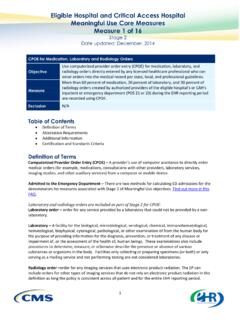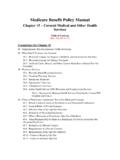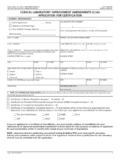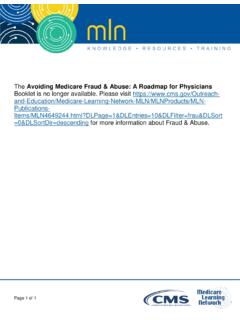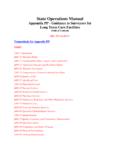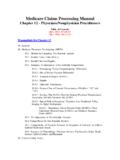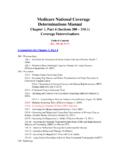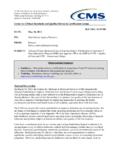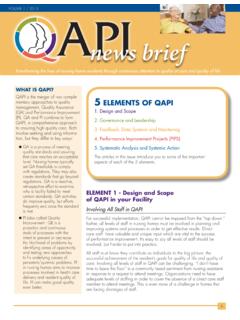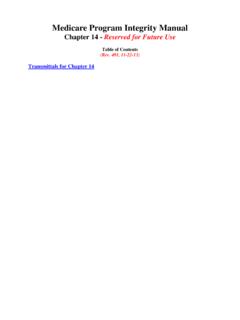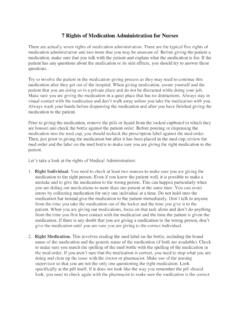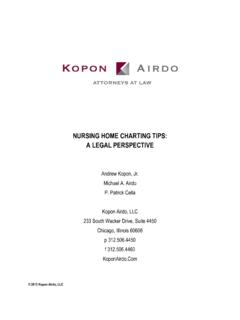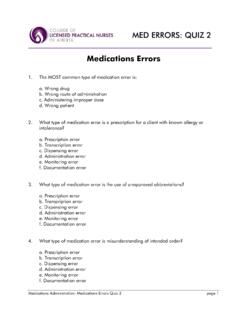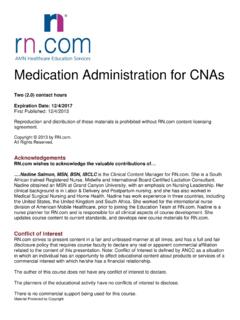Transcription of Medication Reconciliation on Admission
1 Medication Reconciliation on Admission Draft Measure documentation Current as of: December 28, 2016 Draft Measure documentation : Public Comment Period Page | 1 Medication Reconciliation on Admission Composite Measure Table of Contents Draft Measure Information Form ..2 Draft Data Dictionary ..17 Draft Measure Justification Form ..50 Draft Measure documentation : Public Comment Period Page | 2 Medication Reconciliation on Admission Composite Measure Draft Measure Information Form Draft Measure documentation : Public Comment Period Page | 3 Medication Reconciliation on Admission Composite Measure Performance Measure Name: Medication Reconciliation on Admission Description: The average completeness of three components of the Medication Reconciliation process Within 48 hours of Admission for patients admitted to an inpatient facility.
2 Rationale: Incomplete or inaccurate Medication lists may result in Medication errors throughout the inpatient stay and upon discharge from the facility. According to a 2015 study by the Agency for Healthcare Research and Quality (AHRQ), more than half of admitted patients Medication lists contain at least one discrepancy and 40% of these identified discrepancies have the potential to cause harm (AHRQ, 2015). Another study of Medication Reconciliation on Admission found discrepancies between physician Admission Medication orders and the Medication history obtained through interview and that 39% of discrepancies had the potential to cause harm (Cornish, Knowles, Marchesano, et.)
3 Al., 2005). A systematic review published in 2012 examined 26 controlled studies related to hospital-based Medication Reconciliation practices (Mueller, Sponsler, Kripalani, Schnipper, 2012). The studies consistently demonstrated a reduction in Medication discrepancies (17/17 studies), potential adverse drug events (5/6 studies), and adverse drug events (2/3 studies). Although the heterogeneity of the study designs makes it difficult to identify the key elements of successful interventions, accurate pre- Admission Medication lists are critical to the Medication Reconciliation process as identified in the studies. By evaluating not just that a Medication Reconciliation has been completed but that the Medication Reconciliation meets several key criteria to reduce Medication errors , this measure could potentially reduce preventable adverse drug events, which are estimated by the Institute of Medicine (IOM) in its review of evidence to affect million patients per year in in-and outpatient care in the (Aspden, Wolcott, Bootman, & Cronenwett, 2007).
4 Additionally, there are currently the following seven existing related NQF-endorsed measures that address Medication Reconciliation : NQF 0097 Medication Reconciliation NQF 0293 Medication Information NQF 0419 documentation of Current Medications in the Medical Record NQF 0553 Care for Older Adults (COA) Medication Review NQF 0554 Medication Reconciliation Post-Discharge (MRP) NQF 0646 Reconciled Medication List Received by Discharged Patients (Discharges from an Inpatient Facility to Home/Self Care or Any Other Site of Care) NQF 2456. Medication Reconciliation : Number of Unintentional Medication Discrepancies per Patient This proposed measure is different from the other related measures in two important aspects.
5 First, the measure focuses on the Reconciliation process upon Admission to an inpatient facility; whereas existing measures focus on Reconciliation at discharge or transfer. Second, this Draft Measure documentation : Public Comment Period Page | 4 Medication Reconciliation on Admission Composite Measure measure focuses on assessing the quality of the Medication Reconciliation process versus simply documenting that the process was completed. Accurate Medication Reconciliation upon Admission involves three key components: 1) comprehensive PTA Medication information gathering and documentation ( , consideration of multiple sources to ascertain PTA Medication List, PTA Medication form in area of medical record dedicated to Medication Reconciliation , and Reconciliation of the PTA Medication form with other Admission documents that reference PTA medications); 2) completeness of critical PTA Medication information ( , name, dose, frequency, route, last time taken); and 3) Reconciliation action for each PTA Medication by a licensed prescriber.
6 Type of Measure: Composite Improvement Noted As: Increase in the average Numerator Statement: This measure does not have a traditional numerator. The numerator is a facility-level score of the completeness of the Medication Reconciliation process within 48 hours of Admission . This score is calculated by averaging the scores of the three components of the Medication Reconciliation process. The components include: 1) Comprehensive prior to Admission (PTA) Medication information gathering and documentation 2) Completeness of critical PTA Medication information 3) Reconciliation action for each PTA Medication The data elements for each component are listed below.
7 Facilities will indicate how many of the criteria were met for each medical record in their sample and follow the measure calculation logic described under the section Medication Reconciliation on Admission Narratives, to calculate their facility-level score. Component 1 (C-1): Comprehensive prior to Admission (PTA) Medication information gathering and documentation : a) Designated Medication Reconciliation Form/Area: The medical record contains a designated Medication Reconciliation Form/Area that contains a PTA Medication List. b) Patient source: At least one patient source was referenced to generate the PTA Medication List or the patient was clinically unable to provide Medication information and a patient proxy was not available.
8 This criterion is met if the medical record contains documentation that the list of medications was supplied by at least one of the following patient sources: Interview of the patient or patient proxy Medication container brought in by patient or patient proxy Medication list brought by patient or patient proxy Draft Measure documentation : Public Comment Period Page | 5 Medication Reconciliation on Admission Composite Measure Patient clinically unable to provide Medication information and a patient proxy was not available Patient support network including a group home c) Health System Source: At least one health system source was referenced to generate the PTA Medication List.
9 This criterion is met if the medical record contains documentation that the list of medications was supplied by at least one of the following health system sources: Electronic prescribing network system ( , Allscripts , Surescripts ) or aggregate pharmacy billing ( , claims data using state/federal healthcare programs) Nursing home Outpatient provider Outpatient/retail pharmacy or attempt made to contact within 48 hours of Admission Prescription Drug Monitoring Program (PDMP) Prescription in medical record from a prior encounter d) Contains All H&P Medications: All medications in the History & Physical (H&P) or equivalent document are listed in the PTA Medication List.
10 E) Medication Reconciliation Form/Area Reviewed by Prescriber Within 48 hours of Admission : When there are no medications on the PTA Medication List, the Medication Reconciliation Form/Area should be reviewed by a licensed prescriber within 48 hours of Admission . When there are medications on the PTA Medication List, continue to Components 2 and 3. Component 2 (C-2): Completeness of critical PTA Medication information: a) Medication Name: This criterion is met when there is a documented Medication name. b) Medication Dose: This criterion is met when there is a valid documented Medication dose. c) Medication Route: This criterion is met when there is a valid documented Medication route.
